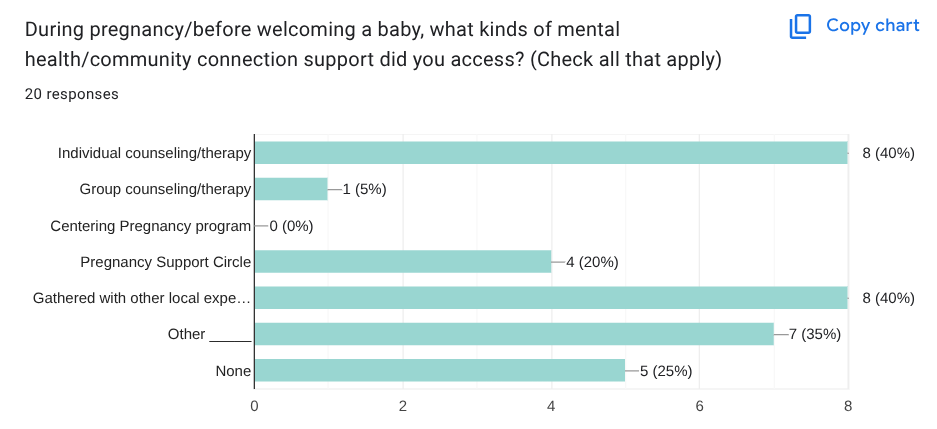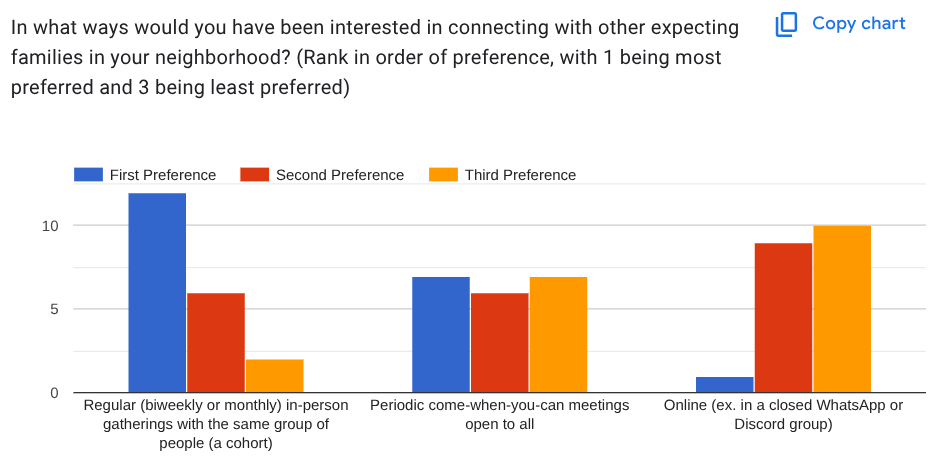Listening First: Findings from Our Prenatal Support Needs Assessment
Local Maternity Thread envisions a world in which prenatal journeys and maternity clothing are shared for healthier communities and a happier planet. This spring, we conducted a needs assessment survey to explore opportunities to build hyper-local peer-to-peer prenatal support communities and learn about which components of the volunteer-led Takoma Families Cohorts model should be replicated for expecting families.
Needs Assessment Learning Questions & Methodology
The survey was open to expecting families and families with young children in the Takoma Park area and was completed by 20 respondents. It was anonymous but included demographic questions to monitor the extent to which responses reflect our diverse community.
The needs assessment survey was a Google Form with multiple-choice, ranking, and open-response questions. It was shared via Takoma Park (DC and MD) and Silver Spring Neighborhood listservs and by Local Maternity Thread’s Facebook and Instagram accounts. We hoped to distribute hard copies of the survey in English and Spanish at Takoma Park/Silver Spring’s Flower Avenue Block Party at the end of May, but the event was unfortunately canceled due to bad weather. There were no incentives offered for completing the survey.
Qualitative responses were analyzed using inductive thematic analysis.
Our Learning/Research Questions
Understanding Prenatal Support Needs:
What are the key challenges families face during pregnancy/before welcoming a baby?
What are the key gaps in community support for expecting families?
In what ways are families interested in connecting with neighbors during pregnancy/before welcoming a baby? I.e. frequency, venue, etc.
Learning from the Takoma Families Group Model:
What were you looking to get out of participating in the Takoma Families Group?
What did you most appreciate about being a part of the Takoma Families group?
What do you hope to get out of it, and didn’t, or, what do you think could be improved?
Respondent Demographics
More than half of survey respondents reported that they have never accessed the Local Maternity Thread clothing closet as either a donor or user. Participants live in Takoma Park (47%), Silver Spring (32%), and Washington, DC (15%).
Most respondents (58%) have one child, about a third (32%) have two children, and the remainder either have three or preferred not to answer. In terms of racial and ethnic identity, 68% of respondents identified as white, 10.5% as Asian, and 5% as Hispanic or Latino; 16% chose not to answer the question about race.
Household income among respondents varied:
37% reported earning $150,000 or more annually
32% reported incomes between $75,000 and $150,000
The remaining 31% either earned less than $75,000 or preferred not to disclose their income
It’s important to note that this group of respondents does not fully reflect the racial diversity of the Takoma Park community. For instance, while approximately 38% of Takoma Park residents identify as white, 68% of survey respondents did. In contrast, income levels among respondents align more closely with citywide patterns, given that Takoma Park’s median household income is approximately $98,000.
Lastly, the survey sample size (20 individuals) represents a small fraction of the total population of local individuals and families of childbearing age and should be interpreted as a starting point for deeper inquiry rather than a comprehensive portrait.
Needs Assessment Findings
Of the challenges respondents faced during their pregnancies/before welcoming a baby, lack of community connection/peer support, physical needs like pain and discomfort, and information needs, such as knowing what to expect when bringing a baby home, came up most often. Challenges finding/deciding on child care and mental health concerns were also expressed.
The most common forms of prenatal mental health/community connection support accessed by respondents were “gathering with local expecting families” (8), “individual counseling/therapy” (7), “other” (7), and “none” (5). Group counseling/therapy, Centering Pregnancy programs, and pregnancy support circles were the least accessed.
Three-quarters of survey respondents indicated that they were interested in meeting and connecting with other expecting families in their neighborhood, while one-quarter said they were somewhat interested. No one selected “not at all interested.”
When asked how respondents would be interested in connecting with other expecting families in their neighborhood, they ranked “regular (biweekly or monthly) in-person gatherings with the same group of people (a cohort) first, “periodic come-when-you-can meetings open to all” second, with “online (ex. In a closed WhatsApp or Discord group)” least preferred.
In terms of what participants would have liked/like to get out of connecting with other expecting families, respondents’ first preference was “just socializing with other expecting families,” followed by “share and listen to what others are experiencing” and “peer-to-peer facilitated discussions.” The three other options, “therapist-facilitated discussions,” “expert advice on topics like nutrition, baby gear, etc.” and “ad hoc discussion in a closed online group, ex. Discord” seemed equally preferred after the first two preferences.
When asked what else they would like to share about the kind of community support they would have wanted during pregnancy/before welcoming a baby, community connections came up most often, especially among families expecting around the same time in the same area. Affinity groups, like communities for single moms, families planning home births, and gestational diabetes groups, were also of interest.
Learning from Takoma Families Postpartum Peer Support Group Experiences
More than half (68%) of the survey respondents had participated in a Takoma Families Group cohort, which is a volunteer-led initiative that convenes new parents with an online chat, events, and expert advice sessions.
Respondents shared that “making new friends who are also new parents” was the primary reason they joined the group, with “having reasons to get out of the house” as the second most common reason, and “accessing expert advice on relevant topics” and “accessing information from peers” as the third and fourth-ranked reasons. “Staving off perinatal depression/anxiety” was chosen least often.
When asked what they most appreciated about being a part of the Takoma Families group, peer connections came up most often, followed by expert advice, the gear swap, peer-to-peer information, and peer-to-peer support. One respondent said they appreciated that it was “a bonding experience with commonalities and differences across many axes.” Another said they liked “that is was mom/family focused (over classes geared towards baby development).”
When asked “what do/did you hope to get out of [the Takoma Families Group], and didn’t, or, what do you think could be improved?”, the most common response, by a landslide, was that respondents hoped they would have come away from the experience with deeper connections and more friends. For example, “I had hoped it would be more tight-knit and I'd make close friends… I probably would've enjoyed getting to know a smaller group of people regularly that lived really close to me.” Other respondents said that the group’s online chat on Discord could sometimes be overwhelming. One respondent “I wish we had a greater diversity of folks in the group. TKPK, SS, Takoma, and beyond are all incredibly diverse places and the group is more homogenous than I expected.”
Conclusions
The needs assessment reveals a clear desire among expecting families in the Takoma Park area for deeper community connection and more structured opportunities for peer support during pregnancy. Respondents reported feeling isolated, uncertain about what to expect in early parenthood, and in need of more localized, relevant information and emotional support. They overwhelmingly preferred in-person, recurring cohort-style gatherings over ad hoc or online models, indicating a strong interest in forming consistent and meaningful relationships with others on similar journeys.
Feedback from past participants in the Takoma Families postpartum peer support group echoes these sentiments. While many appreciated the opportunity to connect with other new parents and access expert resources, several expressed disappointment about the lack of deeper relationships and the overwhelming nature of large, online group chats. A desire for more tightly knit, geographically proximate cohorts and more inclusive, demographically representative groups emerged as important areas for growth.
Taken together, the findings affirm the promise of the peer-led model and suggest several ways it could be refined to better support families during the prenatal stage—particularly by centering small group connection, intentional facilitation, and community diversity.
Next Steps
Based on these insights, Local Maternity Thread will launch a pilot prenatal peer cohort with regular in-person gatherings for expecting families due around the same time and living in close proximity. We will explore opportunities for intentional outreach to ensure broader demographic representation across race, income, and experience through partnerships with local organizations serving underrepresented communities.
Local Maternity Thread will use participant feedback from the pilot cohort to refine the structure, content, and facilitation approaches before scaling. Future assessments should explore what supports the formation of lasting peer relationships and sustainable group dynamics. As we grow this effort, Local Maternity Thread will continue listening to community voices and look for collaborative opportunities with other local stakeholders invested in equitable maternal health and wellbeing.



